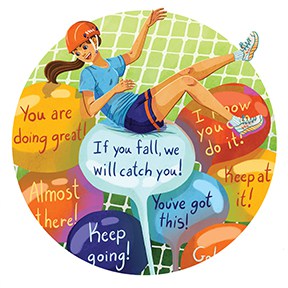HOW WE CAN ALL LEARN TO BE THERE FOR OUR FRIENDS.
Story by Heather Kirk-Davidoff illustration by Kelly Miller
This past summer, I helped out at Agape House, the camp my congregation runs every year for girls from both our church and from our partner church in Baltimore City. This year, for the first time, we used the ropes course at the camp where we spent the week. I have experienced my share of ropes courses over the years as a youth group leader, Girl Scout parent and all-around lover o
In one spot, a series of rope loops of various sizes spanned the distance from one tree to another. I had no idea what they were for. Were you supposed to walk through them, jump over them or swing from them?
“Part of this challenge is to figure out how to use this part of the course,” I told them. “Figure out how to get everyone in your group safely from one tree to the other using these ropes.” Some of the girls swung, some crawled and some climbed through the ropes. One particularly nervous girl was carried by the rest of her team. I’m not sure it was what the designers of the course intended, but we all survived to tell about it!
We had a few minutes to debrief after the adventure so I asked the girls, “What made it easier for you to complete each challenge?” They all said what I was hoping to hear; they got by with a little help from their friends. The cheers, applause and encouragement from the team gave girls the courage to do things she wouldn’t have thought possible.
So I pressed further. Exactly what did people say to encourage you? There were two main responses: “I know you can do it!” and “If you fall, we’ll catch you!” I was intrigued. These two statements are quite different. One proclaims that success is a sure thing. The other suggests that failure is a real possibility. So I asked, which statement is more encouraging?
The girls were unanimous in their response. It is more encouraging to hear that someone will be there for you if you fail than it is to hear that they are convinced you will succeed.
This took me by surprise. I was intrigued not only by the power of this type of encouragement, but by the fact that as an adult, I still had more to learn about how to support the people around me. I’m still learning how to be a friend.
If there’s anything a girl should be born knowing, it’s how to be a friend. I was amazed to watch my daughter form tight friendships with other girls when she barely knew how to talk. But I’ve also watched girls I know tear their friendships apart by spreading rumors, holding grudges, whispering secrets and just plain acting mean.
Parents and mentors are often flummoxed about how to respond to the friendships of the girls in our lives. It usually seems best to stay out of the way. Insisting that a girl include a former friend in a social event is almost always a disaster. So, we complain to each other about all the “drama” in our girls’ lives and hope that in time they’ll grow out of it.
What if friendship is, like mathematics, rock climbing or painting, a skill that we can develop over time and with practice? Then our conversations with the girls in our lives — and our conversations with each other — may begin to focus on learning how to be a friend without dwelling on the relative merits of a particular person who is or is not a friend at the moment.
How do we go about learning to be a friend? Here are a few things we can do — for ourselves and with the girls in our lives.
Do some research. Notice the people in your life who have longstanding, deep friendships. Ask them how they do it. Get past the obvious questions like “What do you look for in a friend?” and get personal: Have you ever gotten mad at a friend? What did you do to resolve the conflict? How much time do you spend with your friend? How often do you talk? What, exactly, do you talk about? Do you talk about other people, or do you talk about yourselves? Are your conversations confidential? It can be powerful for a girl to listen in on this conversation — especially one who has been struggling with her own friendships.
Follow the Golden Rule. Consider how you would like to be treated by a friend. Get explicit about this — write down a list of things that you would appreciate in a friend and Save the Date set out to do every one of those things with your own friends – or those you wish to befriend. Girls of all ages can make these lists easily. It’s the follow-through that’s a challenge, so consider posting your lists as a reminder of your intentions.
Ask. As awkward as it may feel, there’s often nothing better to do than to ask someone in your life, “How can I be a better friend to you?” Listen and take notes. Then follow through.
The strongest friendships in my life are those that have been tested by distance and conflict and by the stress of events beyond our control. My friends keep me sane but they also keep me humble. I am still learning how to be a friend — one who cheers and applauds and one who catches another when she falls. *




